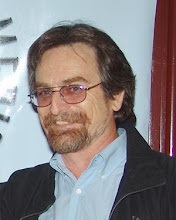Another golden oldie - a poem written by three poets, completed in 1990.
<><><><><><><><><><><><><><><><><><><><><><><><>
The poet isn’t defined by what he
writes. Some poets never write a single
line. Some people write hundreds of
verses and will never really be poets.
The poet isn’t defined by how he or
she lives. Not every drunk is a poet,
and most poets aren’t drunks. Anyone can
adopt a Bohemian lifestyle – it won’t make one a poet any more than it makes
one a Bohemian.
What then defines the poet? Perhaps this:
how he perceives, feels and expresses all the phenomena and sensations
coming around and through him. And what
common thread runs through the diverse lives of poets, through their
incongruous personalities?
Lorca
stepping between the guns on the morning of his assassination.…
Hart Crane
diving into a ship’s propeller….
Rimbaud,
racing for life in Africa after shooting his
lover, finally coming home to die
of syphilis….
Camille
Claudel, driven mad by love, destroying her own work….
Siefert
handing out his poems mimeographed when the government bans his work….
Vallejo starving as he writes
about the thin blade of loneliness….
Van Gogh’s
ear rejected by a whore….
Pascal’s
slashed wrists floating in the ruby water of his bathtub….
Artaud
running with the mad….
Sylvia
Plath’s head in the cold hissing oven….
Chatterton
eating rat poison….
Hemingway
blowing his brains into the orange juice….
Berryman
flying off a bridge….
Burroughs
accidentally shooting his wife in a Mexican bar….
Pound
dragged through the streets in a cage….
Dostoevsky
up against the bullet-scarred wall….
The common thread is a vague
indefinable something that animates
the poet and sends him or her swimming deep and flying high, til the very words
‘exalted’ and ‘degraded’ no longer have any meaning. It is a spark, a charge which drives him in
the futile attempt to encompass all depth and height with his own being, to
learn the questions, discover the answers, find the connections and essence.
The poet
tells truth, using subtle arts:
exaggeration, the misnaming of things, smoky oblique reflections, and
those illogical but revealing comparisons.
And all these acts would be considered unethical and dishonest if used
in normal discourse. But for poetry they
are the meat and sinew, the crushing muscle, the flashing nerve.
And why does the
poet tell that story, use those clever arts?
Because he or she is a poet, and
that is what poets are driven to do.
Because something burns in the most private heart of the poet, something
which forces him – often against his will and contradicting all reason – to
stretch the skin of his soul… so that tamer creatures might finally know how
large they can grow.
-- Charles Bukowski, Lee Mallory & Hakim
© 2012 Hakim - ALL
RIGHTS RESERVED: use without profit allowed only with author’s express
written permission. Please don't wake up my attorney. Please.




